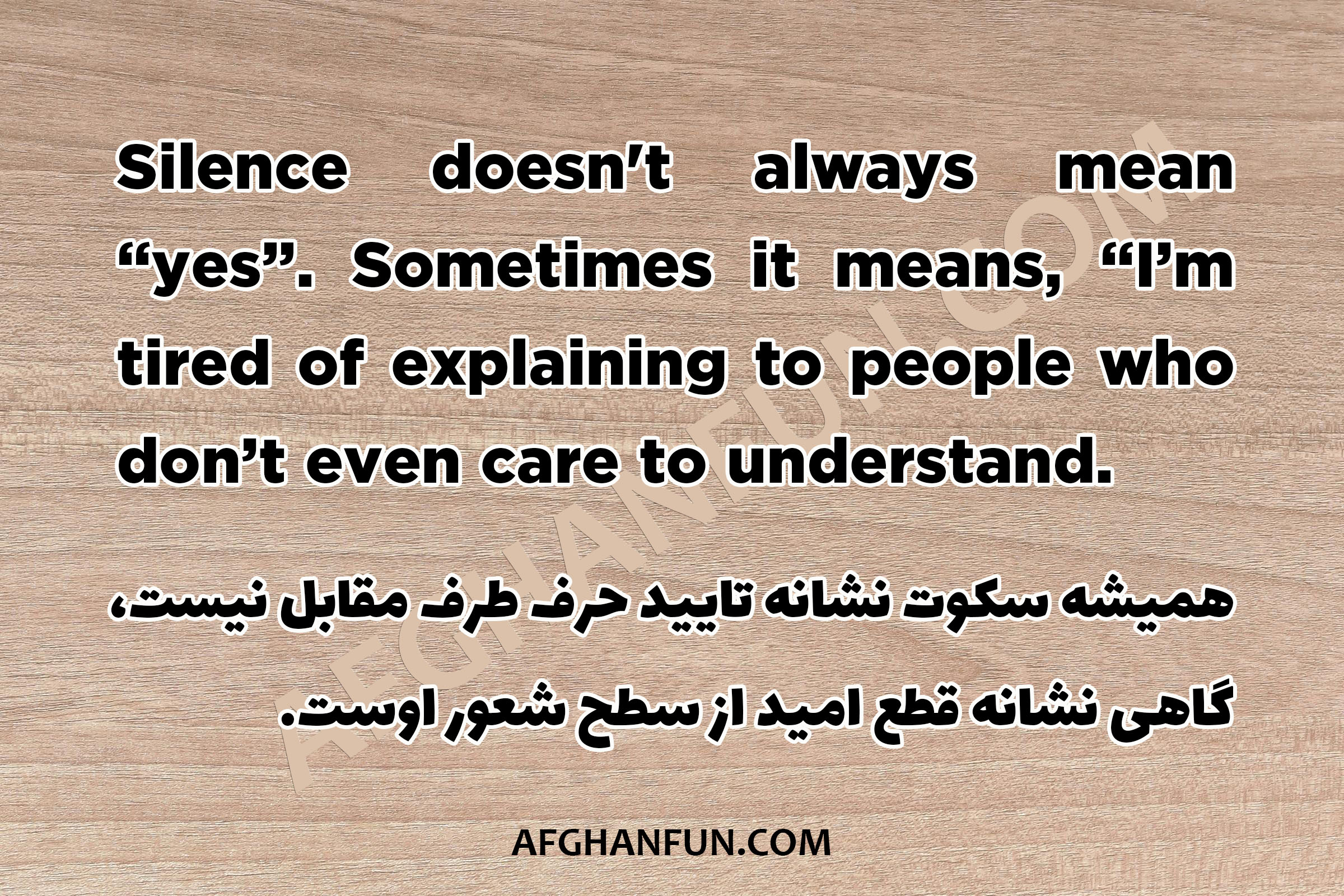The Power of Silence
Silence doesn’t always mean “YES”. Sometimes it means, “I’m tired of explaining to people who don’t even care to understand.
Proverb
When Silence Speaks Volumes
همیشه سکوت نشانه تایید حرف طرف مقابل نیست، گاهی نشانه قطع امید از سطح شعور اوست!
ضرب المثل
این ضرب المثل به ما یادآوری میکند که همیشه سکوت یک نفر به معنای تایید حرفهای طرف مقابل نیست. گاهی اوقات، فرد سکوت میکند چون دیگر امیدوار نیست که طرف مقابل حرفش را بفهمد یا حرفی برای گفتن داشته باشد. به عبارت دیگر، سکوت میتواند نشانه ناامیدی از سطح شعور طرف مقابل باشد.
The Misinterpretation of Silence
Ҳамеша сукӯт нишонаи таъйиди ҳарфи тараф муқобил нест, гоҳеи нишонаи қатъи умед аз сатҳ шуъӯр ӯст!
Зарбулмасал
Ҳамеша вақте ки касе хомӯш мешавад, маънои он нест, ки бо сухани ҳамсуҳбаташ розӣ аст. Баъзан одам хомӯш мешавад, зеро умеди онро надорад, ки ҳамсуҳбаташ суханашро фаҳмад ё ин ки сухани нав барои гуфтан дошта бошад. Яъне, хомӯшӣ метавонад нишонаи ноумедӣ аз сатҳи шуури ҳамсуҳбат бошад.
ليس الصمت دائمًا دليلًا على الموافقة على كلام الطرف الآخر، بل هو أحيانًا دليل على اليأس من مستوى ذكائه!
ضرب المثل
لا يعني الصمت دائمًا أن الشخص يوافق على كلام الطرف الآخر، بل قد يكون دليلًا على يأس المتحدث من فهم الطرف الآخر لكلامه، أو من مستوى ذكائه.
This proverb conveys a deep and nuanced message about human communication and the dynamics of frustration, understanding, and emotional exhaustion. Let’s break it down:
1. Silence Doesn’t Always Mean “YES”
- Silence as ambiguity: The first part of the proverb challenges the common assumption that silence in a conversation or a situation can be interpreted as agreement or consent. People often assume that if someone doesn’t speak up or protest, it means they are in agreement or have no objections.
- The misinterpretation of silence: This part of the proverb suggests that silence can be misunderstood or misread as an affirmative response (“YES”). However, silence can be a complex, layered reaction, and not necessarily an endorsement.
2. Sometimes it Means “I’m Tired of Explaining”
- Emotional fatigue: The second part of the proverb points to emotional exhaustion, a situation in which a person has repeatedly tried to communicate their thoughts, feelings, or desires but has faced repeated misunderstandings or disregard. The individual may become worn out, no longer willing to engage in the same explanations over and over again.
- The limits of patience: Over time, explaining something to someone who doesn’t seem to listen or understand can deplete one’s patience and energy. At a certain point, silence may be a form of self-protection, signaling a withdrawal from the effort to clarify or justify oneself.
3. People Who Don’t Even Care to Understand
- Lack of empathy or willingness to engage: The final part of the proverb emphasizes that the reason for this silence is not just fatigue but also a sense of futility. The person remains silent because they perceive that the other party is not truly interested in understanding their perspective. It highlights a lack of empathy or engagement from the other person, which makes further communication seem pointless.
- Disengagement: This reflects a form of emotional disengagement, where the individual stops trying because they no longer feel that their efforts will result in meaningful change or understanding.
Broader Implications:
- Nonverbal communication: Silence is a powerful form of nonverbal communication. It can express dissent, frustration, or emotional withdrawal even in the absence of explicit verbal disagreement.
- Self-preservation: The proverb also suggests that silence can be a defense mechanism, a way of conserving energy when faced with situations that feel unproductive or emotionally draining.
- Emotional intelligence: The proverb invites reflection on the dynamics of human interactions. It encourages awareness that silence is not always a passive state but can carry deep emotional significance that is often overlooked.
Conclusion:
This proverb captures a situation many people experience in relationships—whether personal, professional, or social—where the act of remaining silent is not due to agreement, but due to emotional exhaustion and a sense of futility in trying to explain oneself to those who are not truly open to understanding. It speaks to the complexities of communication, the limits of patience, and the importance of recognizing the deeper meanings behind silence.











